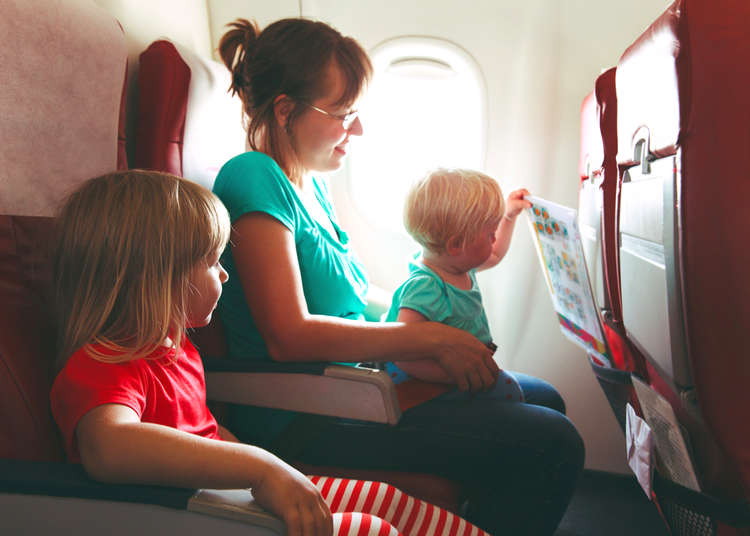
Japan Doesn't Have to be Expensive! How to Budget for a Family Trip to Japan (& Tips From Travelers)
- Written by: Dara Robinson
People think of Japan as expensive, but that need not be the case. While the average expenditure per person in the April-June period of 2019 was 242,437 yen for French travelers, guests from the Philippines spent as little as 119,187 yen (according to www.mlit.go.jp). Let’s have a look at how much is really needed to visit Tokyo, and how you can limit expenditure to save money for your return trip (trust us, you’ll definitely want to return).
Main image credit: Shutterstock / NadyaEugene
As the majority of first-time visitors to Japan choose to go to its bustling capital city, we will focus this article on Tokyo. We’ll consider a typical family trip – two adults and two children spending six nights/seven days in Tokyo. It will cover the fundamentals, from flights to accommodation, to transport and food.
Getting a Cheap Flight to Japan
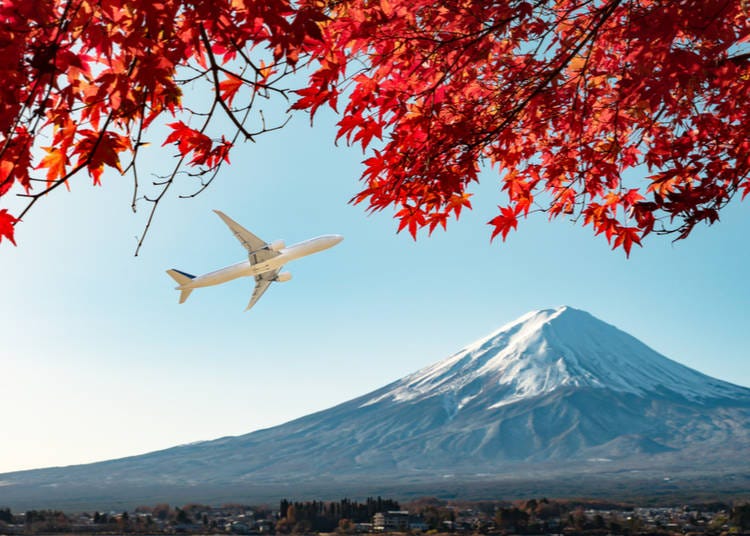
When planning your trip to Japan, remember that Tokyo has two international airports – Narita and Haneda. Haneda Airport is closer to the city and offers three transportation options to go to and from the airport – Keikyu Line (train), monorail, or bus.The cost of the flights to Japan will, of course, vary depending on your departure city, but let us take these three major cities as examples (flight dates April 1st – April 8th).
These are based on [the cheapest direct or near-direct flights] that we found on January 30th, 2020.
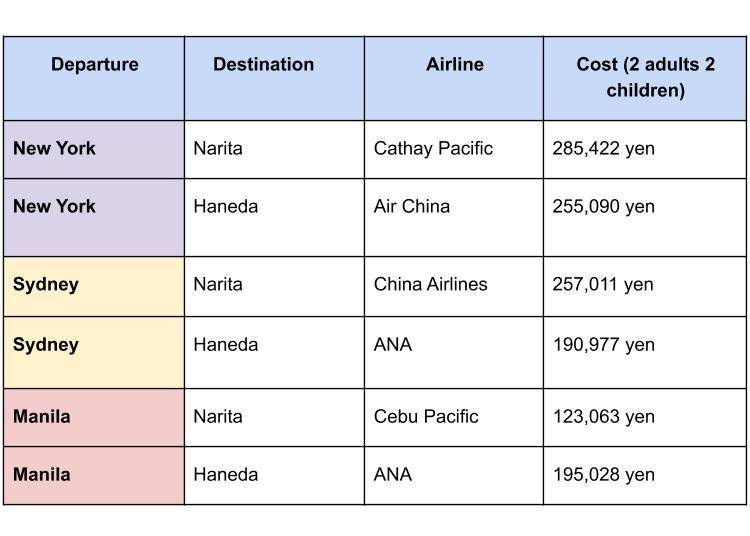
When you travel is also essential. If you’re looking to save money, it’s best to avoid peak seasons in Japan as flights and hotels will double in price.
・Early January: High season for Japanese travelers, prices rise
・Mid-January/February/Early March: Low season
・End of March/Start of April: Peak season, due to cherry blossoms
・End of April/Start of May: Japanese “Golden Week”, prices rise steeply
・June: Rainy season
・August: Summer holidays; high season
・Late September to October: Low season
・November: Autumn colors season
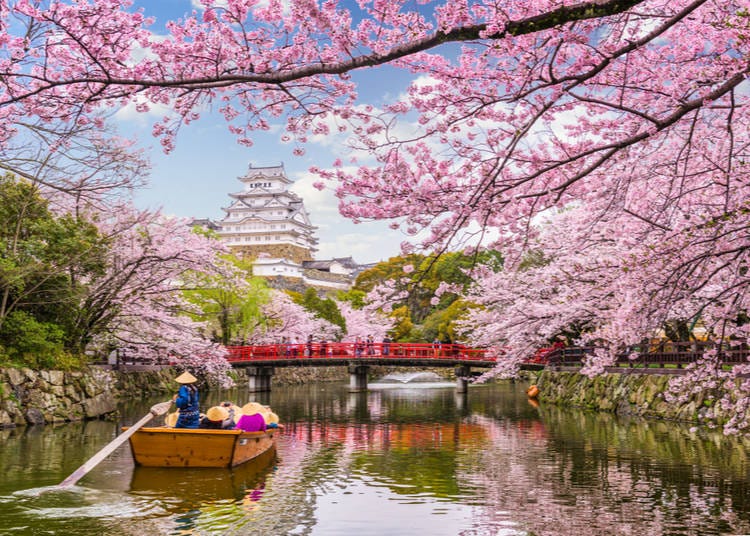
“If you wait for a sale, you can usually get around 50% off your flights!” (Rosalie, mother of three) This advice is very accurate. Many airlines will offer sales such as “fly there, return for free” or “buy one ticket and bring a friend for free” – make sure to keep your eyes peeled for these offers. Also, look for non-direct flights if you want to save some money. For example; while Sydney to Haneda costs 375,166 yen direct, flying via Seoul adds five hours to your trip, but saves you 175,000 yen (the cost as of January 17th 2020, is 260,998 yen return for two adults + two children).
Generally, the best place to find cheap flights is Google Flights. It has an easy to use feature called “date grid” which compares all surrounding to/from dates and shows you the cheapest option for each date. Many countries also have websites dedicated to finding bargains.
Getting from the Airport to Tokyo
Narita is located outside of Tokyo in neighboring Chiba Prefecture, and has a variety of transport options – the Skyliner train takes less than 40 minutes to go to Nippori Station from Narita Airport and costs 2,520 yen, while a highway bus will set you back only 1000 yen to get to Tokyo Station, and takes about one hour.
Accommodation in Japan
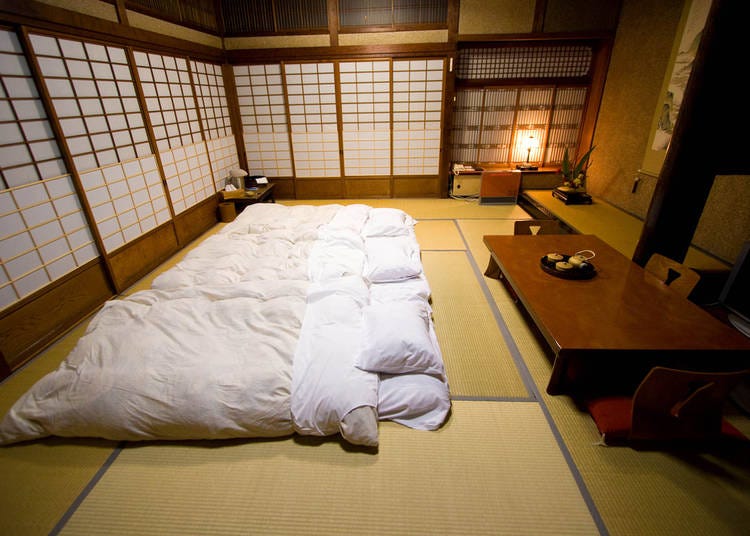
“Stay close to a station at all costs!!” (Charlotte, mother of two)
When booking your accommodation, make sure to choose somewhere near to a station – it’s much easier not having to lug heavy bags through tiny back streets with no street names, and you’ll almost certainly be using the trains a lot. The Yamanote Line circles the center of Tokyo and is thus an excellent line to stay on. Instead of the more popular Shinjuku, try looking for places around Ikebukuro to save some money. Ikebukuro is still a major transport hub, but cheaper than Shinjuku. If you want a more traditional feel, Nippori Station is right next to the beautiful Yanaka area, where you can wander around temples and old shopping streets.
There are various options for hotels in Tokyo. Let’s compare them:
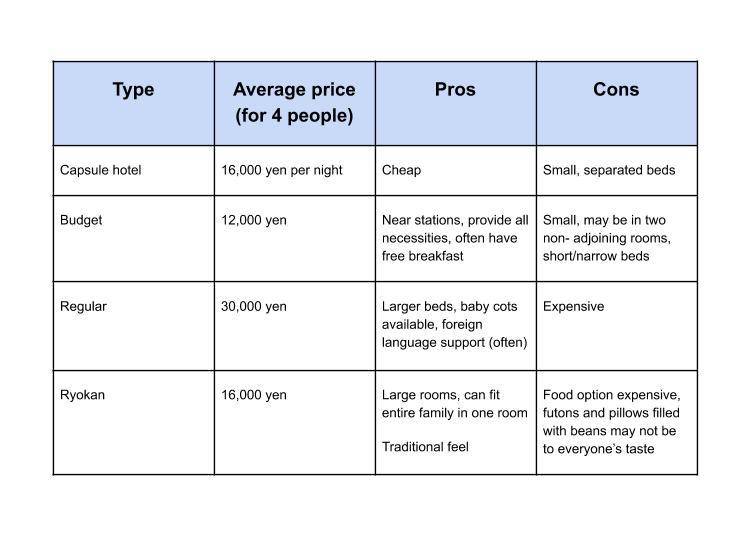
I've found that if you want a more Japanese experience, a ryokan is your best bet. They are well suited to a family, as everyone can sleep on a futon on the floor together, and the rooms tend to be more spacious than in a hotel.
Although recent law changes caused many Airbnb rentals in Japan to close, there are still some good deals to be found, especially for larger groups. And they have the added bonus of laundry and kitchen facilities, and often provide free pocket wifi. They generally cost around 17,000 per night+ for a family of four.
Transport
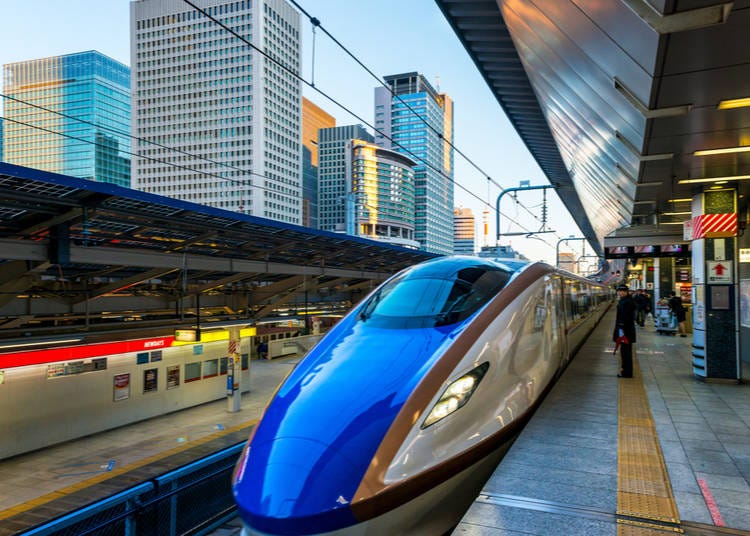
Tokyo has an immense network of buses, trains, and subways. While in Tokyo, you will likely be mostly using Japan Rail (JR), and the two subway companies Tokyo Metro and Toei. Fares differ between each company so it may be easiest to buy a pass (see below) that covers both. You can walk and feel reasonably safe anywhere; however, the city is enormous, and it would be difficult to explore everything on foot as children will get tired. So let’s take a look at the options for saving money on public transport:
1. Tokyo Subway Ticket (Adults 800 yen for 24 hours, 1200 yen for 48 hours, and 1500 yen for 72 hours/children are half price)
This gives you unlimited use of all subway lines, both Tokyo Metro and Toei companies. This is especially beneficial the longer you use it. Imagine three days in Tokyo. On the first day, you start by taking the subway from your hotel in Inaricho to the nearby Asakusa, exploring Sensoji Temple and the surrounding shopping streets. You then take the subway to Ueno and check out the park and zoo. After lunch, you decide to explore the famous anime district of Akihabara, then walk to the nearest subway station and head to Shibuya to see the famous night crossing and eat dinner. Finally, you head back to your hotel. That is five subway trips worth, total cost 960 yen. If that’s an average day, then you would spend 2,880 for three days, or 8640 for a family of four. That is compared to only 4500 using the pass.
2. Tokyo Metro 24 Hour Ticket (Adults 600 yen/300 yen for kids)
This covers all Metro lines for 24 hours, but does not include Toei lines. Check your itinerary to confirm which lines you will need to see if this is more beneficial than the pass above.
3. Tokunai Pass (Adults 760 yen/kids 380 yen)
This pass allows unlimited rides on local and rapid JR East trains (excluding reserved seats) within Central Tokyo.
4. Tokyo 1 Day Ticket (Adults 1600 yen/kids 800 yen)
Using this pass, you can ride all local and rapid JR East trains (excluding reserved seats) within Central Tokyo as well as on the subways, the Nippori-Toneri Liner, Tokyo Toei streetcars and the Toei Bus system. If you plan to fit in a lot to each day, having both JR and subways covered would be most beneficial.
5. Rental bike
If you want to be really frugal, renting a bike is a good option and can be done for only 300 yen a day!
If you don’t wish to buy a transit pass, individual trips are around 170-300 yen each, one-way.
Food
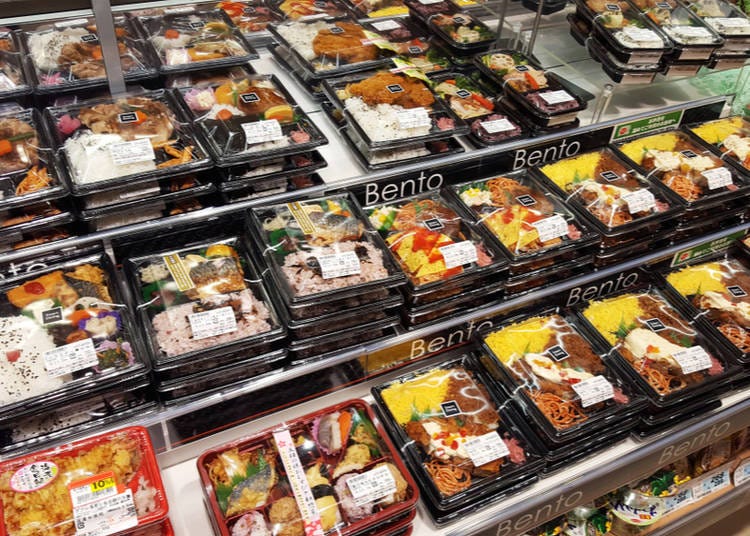
“Go to the supermarket after 8pm and find 50% off bentos & sushi.” (Tetsunori, Japanese resident)
I've found that this is undoubtedly a good way to save money. On the very frugal end, you have supermarket or convenience store bentos (pre-cooked boxed meals) readily available all over Tokyo for about 400-600 yen each. Not to mention the good old onigiri (rice balls). In terms of restaurants – if you’re traveling with kids, family restaurants are always convenient.
Some easy examples that I've found are "family restaurants" like Saizeriya (Japanese style Italian), where one kid’s meal is 299 yen, the current seasonal special is 899 yen and a pasta dish is 399 yen. You can definitely feed the family for under 2000 yen. Similar places I like include Gusto, Jonathan's or Dennys. For a still cheap but more Japanese feel, I'd suggest Matsuya or Yoshinoya, or Ootoya, which is a bit more expensive but higher quality (About 3000 yen for a family). And don’t forget to try a sushi train (such as Sushiro) – only 100 yen per piece!
If you want somewhere slightly more upmarket, expect to pay around 1000 yen per person for a lunch set, and 1500 yen for a dinner meal. Of course, you can go much higher than that, but it’s not always necessary.
(Prices accurate at time of posting)
Attractions
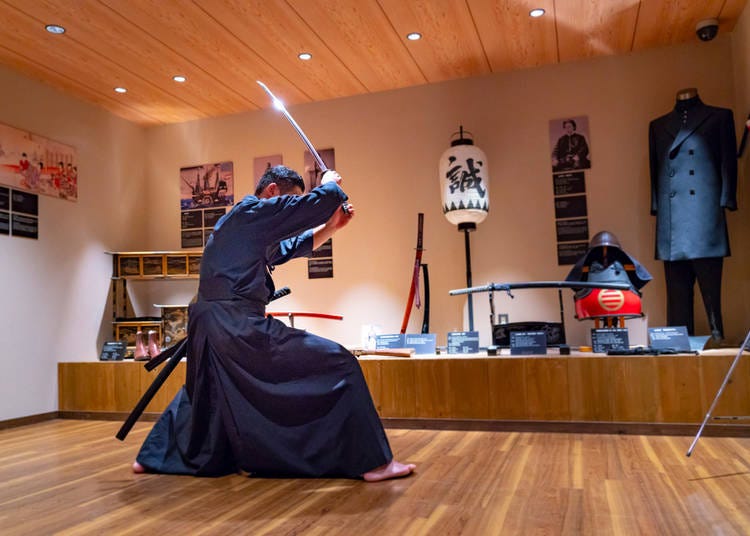
“Make a list of ‘must-do’ places and another of optional places to see” (Lisa, mother of one)
There are so many things to do in Tokyo that it can seem tempting to try and fit in everything, but we recommend pacing yourself to ensure you thoroughly enjoy everything that you do manage to do. Tokyo isn’t cheap, so you’ll want to budget accordingly. Here are some prices for popular attractions:
・Disneyland/Disneysea: Adults 7,500 yen, kids 4,900 yen
・Fuji Q Highlands: 5,800 yen
・Animal cafes: Usually range from 800-1600 yen (note that many animal cafes don’t allow young children so check in advance to avoid disappointment!)
・Teamlab Borderless: Adults 3,200 yen, kids 1000 yen
・Tokyo Skytree: Adults 1000 yen, kids 500 yen
・Ikebukuro – Sunshine Aquarium: Adults 2,200 yen, kids 1,200 yen
・Ueno Zoo: Adults 600 yen
・Ghibli Museum: 1000 yen
・Samurai Museum; Adults 1800 yen, kids 800 yen
・Edo Museum: Adults 600 yen, kids free
・Sumo: Adults 2,200 yen, kids 200 yen
Everyone should note that these tourist sites can be skipped in favor of free or very cheap outings. You can explore areas like Harajuku and Asakusa on foot, checking out free temples like Meiji Jingu on the way. The Earthquake Prevention Center in Ikebukuro is free and pretty impressive, and can be combined with a walk around the historic Yanaka area. If you want to see Tokyo from above but don’t want to pay for Skytree, the Metropolitan Building in Shinjuku allows you to go up 202m to see spectacular views of the city – for free.
Money-saving tips for visiting Japan from real travelers
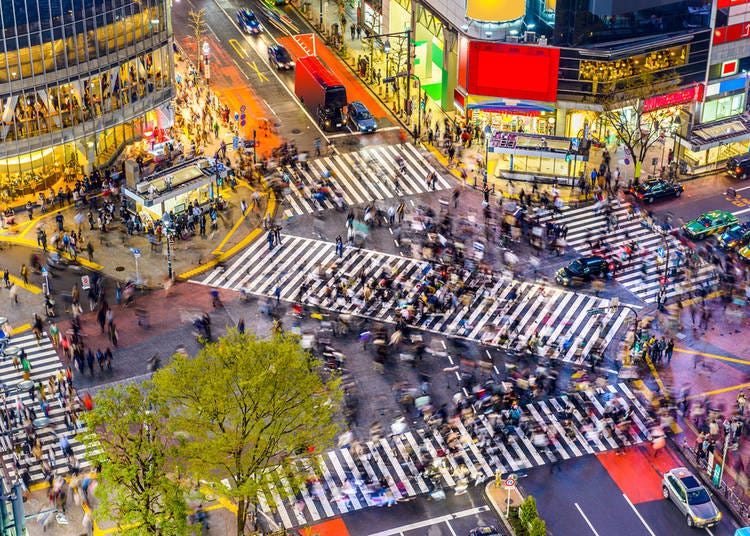
Here are some more tips from seasoned travelers:
・If you have small kids – “Make sure to visit some indoor soft play areas - the one in the Tokyo Dome area (Asobono) was absolutely amazing.” (Amy, mother of two)
・“Wear shoes that you can easily take on and off because you have to remove your shoes for every shrine!” (Michelle, mother of two)
・“Always carry your passport to get tax free discounts while shopping.” (Dave) (Editors note: All foreign travelers must carry their passport with them at all times.)
・“If you want your money to go as far as possible - I'd focus on dining out during lunchtime rather than dinner. Most restaurants will do specials around lunchtime, saving you a ton of money.” (Lee)
・“Cluster the places of interests into areas. There's tonnes of places that are within walking distance to one another. Doing so, you'll only need to take the trains twice a day. One to get into the area, and one back to your accommodation. That way, you wouldn't even need any of the subway/train passes.” (Albert, father of one)
・“Look for family rooms in hostels or backpacker inns.” (Ramesh) – These can be a much cheaper rate than hotels, and still give you a private room.
Total Expenses
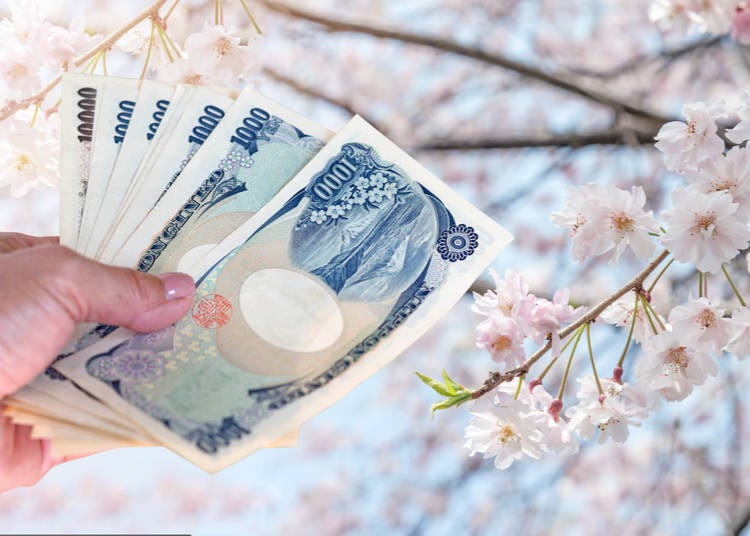
So how much is the cost of a trip to Japan for families? Let’s base this on a family of four, staying in a budget hotel and doing one attraction per day. It involves three meals a day and buying the Tokyo Subway Pass + individual tickets for the remaining four days.
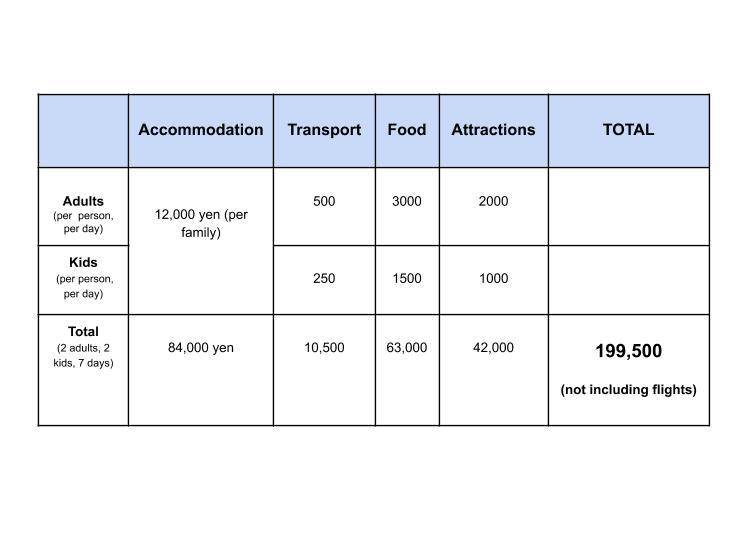
So as you can see, it is possible for an entire family to spend a week in Japan for under 200,000 yen, without missing out on any experiences. So don’t be discouraged by how expensive Japan CAN be, now that you see it needn’t be. Happy travels!
Originally from New Zealand, Dara is an avid traveler, having also lived in 5 different countries. She has been a resident of Japan since 2014 and has explored all 47 of its prefectures. An aficionado of the great outdoors, Dara thrives on adrenaline-packed activities like ziplining and canyoning. Beyond her writing, she specializes in crafting custom-made tours, infusing them with personal insights and recommendations. As a mother, Dara has firsthand knowledge of navigating Japan with young ones, a perspective she weaves into her articles.
- Area
- Category
*Prices and options mentioned are subject to change.
*Unless stated otherwise, all prices include tax.
Recommended places for you
-

Shinjuku Gyoen National Garden
Gardens
Shinjuku
-

Ueno Zoo (Ueno Zoological Gardens)
Zoos, Aquariums & Botanical Gardens
Ueno
-

Naritasan Shinshoji Temple
Temples
Narita
-

TOKYO SKYTREE®
Landmarks
Ryogoku / TOKYO SKYTREE(R)
-
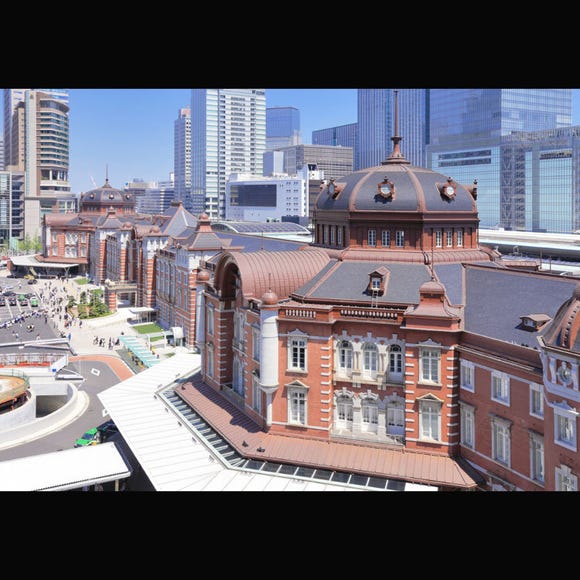
The Tokyo Station Marunouchi Building
Landmarks
Tokyo Station
-
Events

Tokyo Tower
Landmarks
Roppongi
-

No more using real katana for tourism activities, Japan’s National Police Agency says
-

Via Inn Prime Osaka Kyobashi Mizukinoyu: A Convenient Hotel Near Osaka Castle with Open-Air Baths and Nearby Sightseeing
by: Yotsuka Hizuki
-

Abandoned school being used for foreign tourists to experience Japanese high school in Chiba
-

Uji matcha tea specialist from the Edo period releases a range of sweets for hydrangea season
-

Angry Japanese mayor wants off-season Mt. Fuji hikers to pay costs of their rescue operations
-

Fireflies in downtown Tokyo – Beautiful hotel garden begins hotaru season event
Inspiration for Accommodations
-

Enjoy Mt. Fuji from the Comfort of Your Room! Recommended Ryokan with Mt. Fuji View
-

Stay Near the Cherry Blossoms! Hotels for Cherry Blossom Viewing in Tokyo
-

Family-Friendly Hotels with Free Shuttle to Disneyland: Convenient Access for a Magical Stay
-

Top Ranked Hakone Hotels with Mt. Fuji View: Enjoy Stunning Scenery from Your Private Space
-

Convenient Tokyo Hotels with Airport Shuttle: Ideal for Families and Heavy Luggage
-

Stunning Tokyo Tower View Hotels: Enjoy Spectacular Scenery from Your Private Space
-

Convenient Asakusa Hotels with Kitchens: Ideal for Extended Family Visits
-

Experience Luxury: Hakone's 10 Best Five-Star Accommodations
-

Enjoy Mt. Fuji Autumn Leaves! Top Hotels Near the Popular Autumn Leaves Corridor
-

Experience Hakone Fall Foliage from Your Room with Stunning Views
-

8 Unfamiliar (But Totally Normal) Customs in Japan!
-
Ad

Spring in Taito: Home to Ueno & Asakusa! Step off the beaten path and curate your perfect 1-day itinerary
-

Complete Guide to Buying Japanese Medicine in Japan: Phrases and Vocabulary You Need to Know
-

Golden Gai – Tokyo Shinjuku’s Atmospheric Bar Wonderland and the Secrets Behind its Magic
-

Tokyo Sakura Tram: Experience Tokyo's Secret Neighborhoods, Off the Beaten Path!
-
Ad

Japan Has New, Easy Mobile Charging Stations?! We Give New ChargeSPOT a Go!
- #best ramen tokyo
- #what to buy in ameyoko
- #what to bring to japan
- #new years in tokyo
- #best izakaya shinjuku
- #things to do tokyo
- #japanese nail trends
- #what to do in odaiba
- #onsen tattoo friendly tokyo
- #daiso
- #best sushi ginza
- #japanese convenience store snacks
- #best yakiniku shibuya
- #japanese fashion culture
- #best japanese soft drinks














